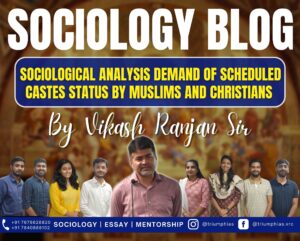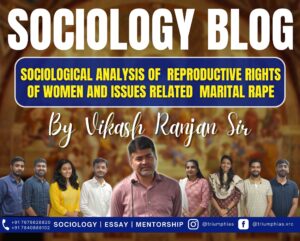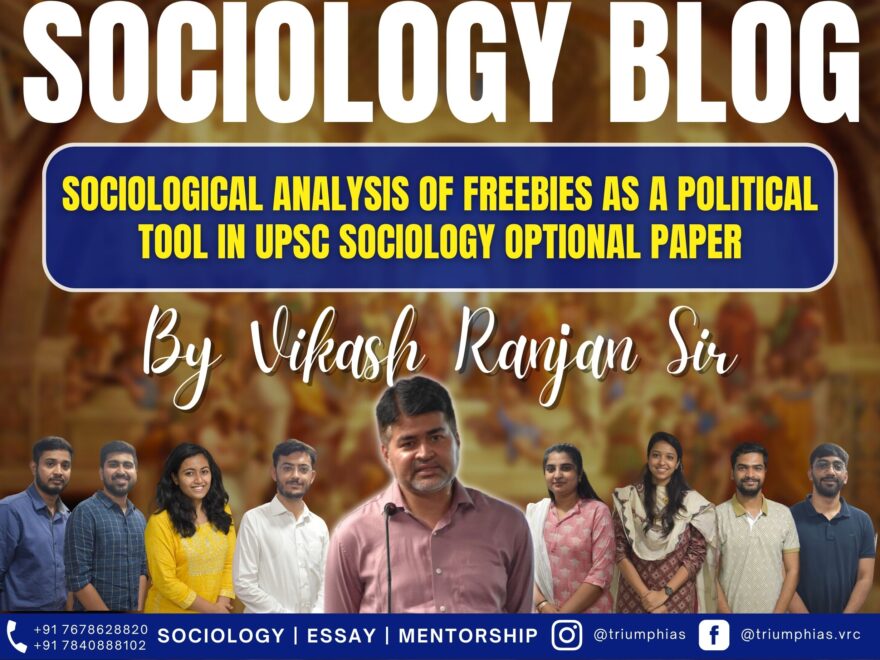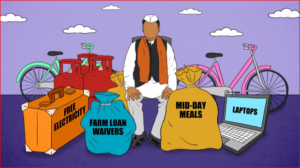Freebies
(Relevant for Sociology Optional for Civil Services Examination)
Paper 2: Politics and Society, Challenges of Social Transformation

Context :
Freebies have become political tool near elections and its relation with mounting Debt To GDP Ratio have states have started the debate around it .
Sociological Analysis
|
What is Freebie?
- Freebies, as defined by the Reserve Bank of India, are public welfare measures provided free of charge.
- They are distinct from public/merit goods like education and health, which have wider and long-term benefits.
- Supreme Court Viewpoint : The Supreme Court, in S. Subramaniam Balaji vs Government of Tamil Nadu (2013) upheld the distribution of television sets or consumer goods on the ground that schemes targeted at women, farmers and the poorer sections were in furtherance of Directive Principles; and as long as public funds were spent based on appropriations cleared by the legislature, they could neither be declared illegal, nor the promise of such items be termed a ‘corrupt practice’.
Importance of Freebies:
- Employment:
- Freebies contribute to building a healthier and stronger workforce, essential for overall growth.
- Participation in programs like MGNREGA ensures assured wages and upholds the right to a dignified life.
- Poverty Reduction:
- Studies highlight the poverty-reducing impact of the Public Distribution System (PDS).
- Subsidized or free rations through PDS make essential food grains affordable for consumers while ensuring fair prices for farmers.
- Food Security:
- Subsidized distribution of food grains through PDS plays a crucial role in ensuring basic food security for vulnerable populations.
- Initiatives like PMGKAY prevented many from facing starvation during the COVID-19 pandemic.
- Education:
- Mid-day meals in schools contribute to increased school enrolment and retention.
- Addressing classroom hunger through such programs also helps in curbing child labor.
- Women Empowerment:
- Free bus passes for women in Tamil Nadu encourage their participation in the workforce, leading to more economically stable families and women’s empowerment.
- Reduction in Social Evils:
- The introduction of free color television in villages led to a decrease in domestic violence.
- Improved access to visual media empowers women and children, fostering self-respect and reducing dependency on wealthier households.
- Increased Productivity:
- Subsidies like free laptops have become essential tools for enhancing productivity, knowledge, and skills.
- Boosting Industrial Growth:
- Fiscal incentives in Kerala encourage corporate and entrepreneurial engagement, contributing to industrial growth.
- Equity Perspective:
- The term “freebies” typically refers to small amounts given to the poor, while similar benefits for the rich are often labelled as “incentives.”
Issue with Freebies:
Freebies and Welfare:
- The distinction between freebies and welfare lies in their impact on beneficiaries and society.
- Welfare schemes have a positive impact, while freebies can create dependency and distortions.
- Freebies are goods/services given free of charge, often aimed at short-term benefits and populist promises.
- Welfare schemes are well-planned programs that fulfil constitutional obligations towards citizens, promoting social justice, equity, and human development.
Way Forward:
- Drawing a Line Between Welfare and Freebie:
- Distinguish between subsidies and freebies, understanding the economic implications.
- Subsidies are targeted benefits, while freebies are different in nature.
- Clear Rationale and Indication of Funds:
- Political parties should disclose financing, trade-offs, and impact of freebies to voters and the Election Commission (ECI).
- Specify sources of revenue, fiscal balance impact, opportunity cost, and sustainability.
- Empower the Election Commission of India:
- Strengthen the ECI’s authority to regulate and monitor freebies during elections.
- Impose penalties, de-register parties, or take action for violating codes of conduct.
- Voter Awareness:
- Educate voters about economic and social consequences of freebies.
- Encourage voters to demand accountability from parties through awareness campaigns, literacy programs, and media initiatives.
- Judicial Intervention:
- Judicial involvement necessary for impartial decision-making on freebies.
- Supreme Court’s proposal for an expert committee comprising Niti Aayog, Finance Commission, RBI, and stakeholders to study freebie impact.
- Focus on Inclusive Development:
- Address root causes of poverty and inequality to reduce vulnerability to freebies.
- Promote economic growth and social progress for long-term benefits through inclusive development.
The approach should be aligned with the proverb: “Give a man a fish and you feed him for a day, teaches a man to fish and you feed him for a lifetime.”
Sample Question for UPSC Sociology Optional Paper:
Q 1: Explain how “Elite Culture” manifests through the distribution of freebies during elections.
Answer: Elite Culture in the context of freebies can perpetuate a form of elitism that treats the marginalized sections as dependent on these handouts, thereby denying them agency and reinforcing existing social hierarchies.
Q 2: How does the Patron-Client Syndrome influence voter behavior in elections? Answer: The Patron-Client Syndrome creates a dependency loop between political parties and voters, where the latter feel obligated to vote for a party in return for the freebies received, compromising the democratic process.
Q 3: What is the role of the Supreme Court in regulating freebies according to S. Subramaniam Balaji vs Government of Tamil Nadu (2013)?
Answer: The Supreme Court upheld the distribution of freebies if they target marginalized sections like women and farmers and are aligned with the Directive Principles, as long as these schemes are funded through legislative appropriations.
Q 4: How does Gilles Verniers’ concept of ‘Competitive Populism’ relate to freebies?
Answer: Gilles Verniers argues that competitive populism can shift the focus of governance from long-term policy solutions to short-term material benefits, thereby affecting overall governance quality.
Q 5: What is the Marxian perspective on the role of freebies in modern politics?
Answer: From a Marxian viewpoint, freebies act as tools for the capitalist state to suppress the development of true class consciousness, thereby hindering any revolutionary impetus among the marginalized.
Q 5: Explain the difference between welfare and freebies.
Answer: While welfare schemes are well-planned programs aimed at long-term social justice and human development, freebies are often short-term measures that can create dependency and distortions in the socio-political landscape.
Related Blogs …
 |
 |

To master these intricacies and fare well in the Sociology Optional Syllabus, aspiring sociologists might benefit from guidance by the Best Sociology Optional Teacher and participation in the Best Sociology Optional Coaching. These avenues provide comprehensive assistance, ensuring a solid understanding of sociology’s diverse methodologies and techniques.
META TAGS:
freebies, politics, Sociological Analysis, elections, elite culture, patron-client, nation, democracy and citizenship, political parties, pressure groups, Sociological Analysis freebies, social and political elite. Regionalism and decentralization of power, secularization, Sociological Analysis, caste conflicts, poverty, deprivation and inequalities, ethnic conflicts, communalism, religious revivalism, illiteracy and disparities in education, Dipankar Gupta, Gilles Verniers, T.H. Marshall, Marxian analysis, social transformation, social rights, welfare policies, Reserve Bank of India, Supreme Court, employment, poverty reduction, food security, education, women empowerment, Election Commission of India, Sociological Analysis
Why Vikash Ranjan’s Classes for Sociology?
Proper guidance and assistance are required to learn the skill of interlinking current happenings with the conventional topics. VIKASH RANJAN SIR at TRIUMPH IAS guides students according to the Recent Trends of UPSC, making him the Best Sociology Teacher for Sociology Optional UPSC.
At Triumph IAS, the Best Sociology Optional Coaching platform, we not only provide the best study material and applied classes for Sociology for IAS but also conduct regular assignments and class tests to assess candidates’ writing skills and understanding of the subject.
Choose The Best Sociology Optional Teacher for IAS Preparation?
At the beginning of the journey for Civil Services Examination preparation, many students face a pivotal decision – selecting their optional subject. Questions such as “which optional subject is the best?” and “which optional subject is the most scoring?” frequently come to mind. Choosing the right optional subject, like choosing the best sociology optional teacher, is a subjective yet vital step that requires a thoughtful decision based on facts. A misstep in this crucial decision can indeed prove disastrous.
Ever since the exam pattern was revamped in 2013, the UPSC has eliminated the need for a second optional subject. Now, candidates have to choose only one optional subject for the UPSC Mains, which has two papers of 250 marks each. One of the compelling choices for many has been the sociology optional. However, it’s strongly advised to decide on your optional subject for mains well ahead of time to get sufficient time to complete the syllabus. After all, most students score similarly in General Studies Papers; it’s the score in the optional subject & essay that contributes significantly to the final selection.
“A sound strategy does not rely solely on the popular
Opinion of toppers or famous YouTubers cum teachers.”
It requires understanding one’s ability, interest, and the relevance of the subject, not just for the exam but also for life in general. Hence, when selecting the best sociology teacher, one must consider the usefulness of sociology optional coaching in General Studies, Essay, and Personality Test.
The choice of the optional subject should be based on objective criteria, such as the nature, scope, and size of the syllabus, uniformity and stability in the question pattern, relevance of the syllabic content in daily life in society, and the availability of study material and guidance. For example, choosing the best sociology optional coaching can ensure access to top-quality study materials and experienced teachers. Always remember, the approach of the UPSC optional subject differs from your academic studies of subjects. Therefore, before settling for sociology optional, you need to analyze the syllabus, previous years’ pattern, subject requirements (be it ideal, visionary, numerical, conceptual theoretical), and your comfort level with the subject.
This decision marks a critical point in your UPSC – CSE journey, potentially determining your success in a career in IAS/Civil Services. Therefore, it’s crucial to choose wisely, whether it’s the optional subject or the best sociology optional teacher. Always base your decision on accurate facts, and never let your emotional biases guide your choices. After all, the search for the best sociology optional coaching is about finding the perfect fit for your unique academic needs and aspirations.
Follow us :
🔎 https://www.instagram.com/triumphias
🔎https://www.youtube.com/c/TriumphIAS
https://t.me/VikashRanjanSociology
Find More Blogs
|
Scope of the subject and comparison with other social sciences |
|||
|
|
|
|
Modernity and social changes in Europe |



One comment